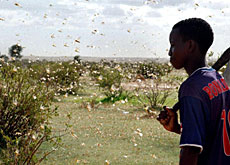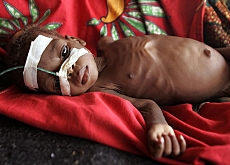No end in sight for East Africa drought

The Swiss Agency for Development and Cooperation (SDC) says there is no end in sight to the drought in parts of Kenya, Somalia, Djibouti and Ethiopia.
The warning comes as Switzerland prepares to join the countries concerned, aid agencies and the United Nations at a donor and coordination meeting in Nairobi on Thursday.
According to the UN World Food Programme (WFP), millions of people across the Horn of Africa are in urgent need of food supplies.
On Tuesday the WFP said it would have to stop food distributions in Kenya from February if the international community does not provide more financial help.
Jacques Bovier, the coordinator of SDC regional activities who is based in the Kenyan capital, told swissinfo that the Swiss government was focusing not on particular countries but on the region as a whole.
“Since this is a regional problem, affecting not just Kenya but also the southern part of Somalia and some parts of Ethiopia and Djibouti, we have to plan on a regional basis,” he said.
He added that one of the key challenges for aid agencies was to ensure that emergency food rations reach those who need them most.
“Take the problem of piracy off the coast of Somalia. If you try to bring food to Somalia by sea, the shipment may be attacked and the food will never reach the country.
“So right now the supplies have to go to Kenya, before being brought by road from there to Somalia. But this food destined for Somalia may still be attacked or stolen by people in Kenya who are also suffering from drought.”
Food supplies
The SDC has made the safe passage of food aid between Kenya and Somalia one of its key priorities.
The agency has welcomed an investigation by the Kenyan government into how food aid destined for famine victims recently ended up for sale at a market.
“This has been a small problem, but the authorities are looking into it to make sure that food donations reach the beneficiaries,” said Bovier.
Humanitarian and aid organisations are preparing to meet in Nairobi later this week to review the scale of the drought.
“The meeting on Thursday between the countries concerned, the UN, donor countries and NGOs is a chance to look closely at the situation in Kenya, Ethiopia, Djibouti and Somalia,” said Bovier, who will be attending the talks on behalf of the Swiss government.
He expects the meeting will lead to a fresh appeal for international assistance and says that the SDC is “definitely” considering stepping up its humanitarian aid effort across the region.
Swiss aid
Assistance will be primarily provided in cooperation with the WFP, but the SDC also expects to help finance projects coordinated by Swiss non-governmental organisations working in the region.
Switzerland has said that it is ready if need be to assist the Swiss-run International Committee of the Red Cross in ensuring that “food convoys” are not disrupted and that in the event of clashes between different communities the aid continues to reach the people who need it.
“We have to ensure that convoys are not robbed and that food and water get to the right places. This is very important, because too many clashes could lead to a serious problem in the region,” said Bovier.
“The situation is deteriorating. There is no rain in sight, and even if rain does come – normally in April or May – it will be months before the next crop is ready. So the food shortages will become even more severe.”
swissinfo, Ramsey Zarifeh
The WFP estimates the numbers of people hit by drought as follows: 2.5 million in Kenya, 1.4 million in Somalia, 1.5 million in Ethiopia and 60,000 in Djibouti.
The Geneva-based International Federation of Red Cross and Red Crescent Societies described the failure of the short rains between October and December as a “harsh blow” which has put additional pressure on sparse pasture and water supplies.
The government of Kenya has declared the drought a national disaster. It says the number of Kenyans in need of food aid has nearly doubled to almost four million.

In compliance with the JTI standards
More: SWI swissinfo.ch certified by the Journalism Trust Initiative


You can find an overview of ongoing debates with our journalists here. Please join us!
If you want to start a conversation about a topic raised in this article or want to report factual errors, email us at english@swissinfo.ch.